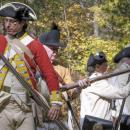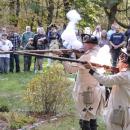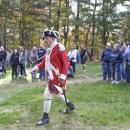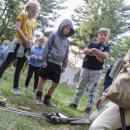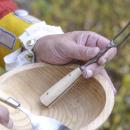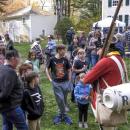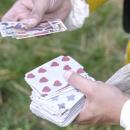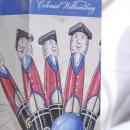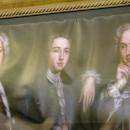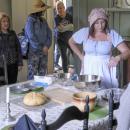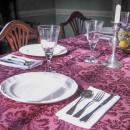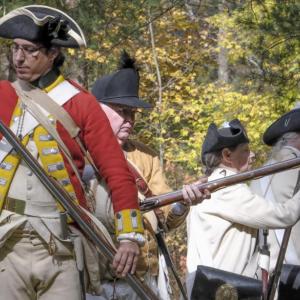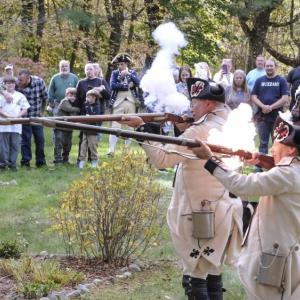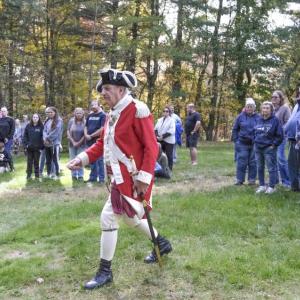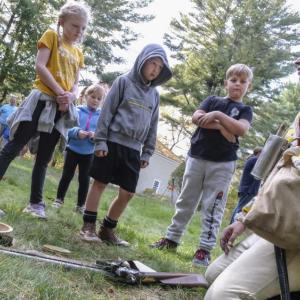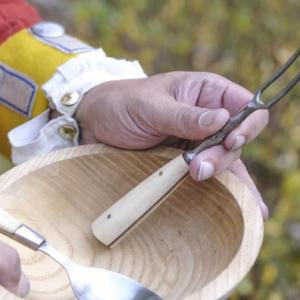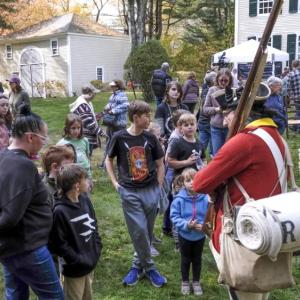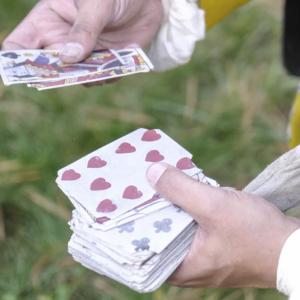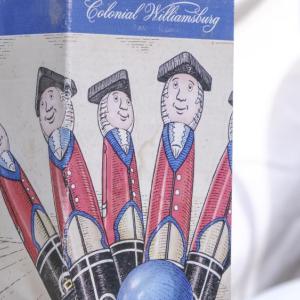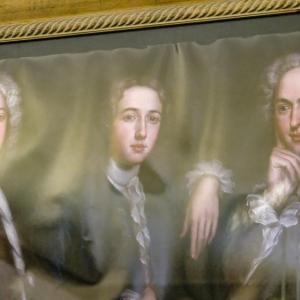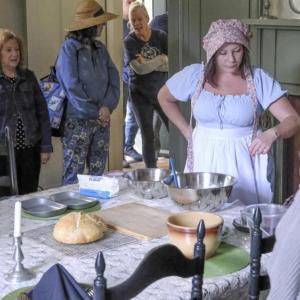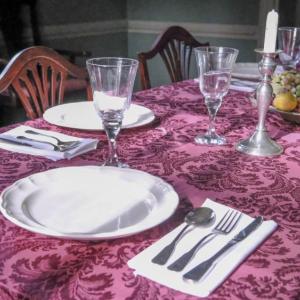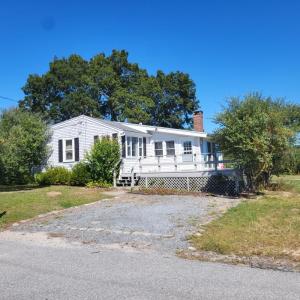Colonial reenactment revisits Middleboro’s Oliver Estate to offer a portal to the past
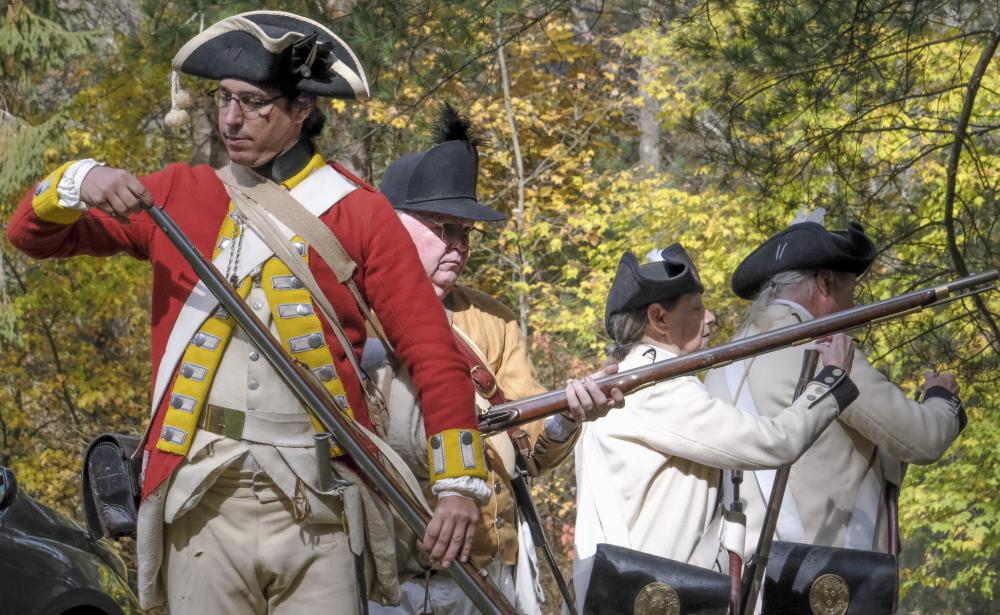 Kyle Dunbar, left, loads a musket during a military drill at the colonial reenactment held at the Oliver Estate in Middleboro, Sunday, Oct. 19. Photos by Sam Tucker
Kyle Dunbar, left, loads a musket during a military drill at the colonial reenactment held at the Oliver Estate in Middleboro, Sunday, Oct. 19. Photos by Sam Tucker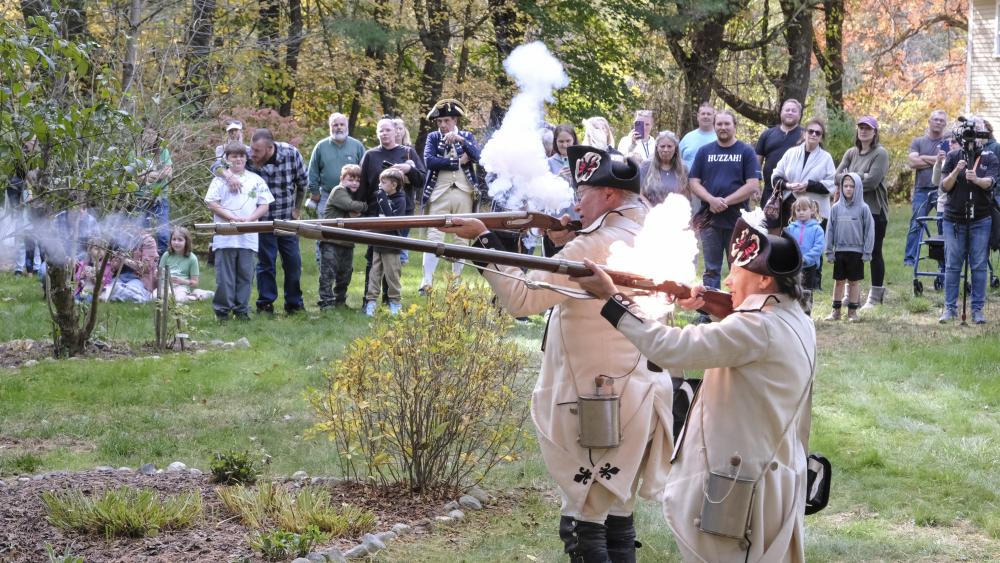 French soldier reenactors fire their muskets in tandem.
French soldier reenactors fire their muskets in tandem.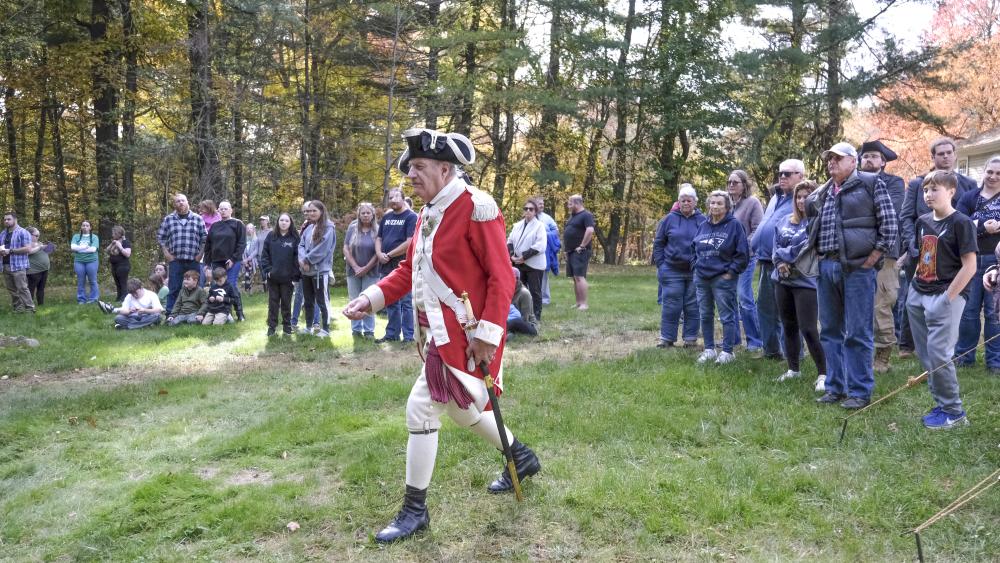 A British soldier reenactor walks in front of the crowd during a drill.
A British soldier reenactor walks in front of the crowd during a drill.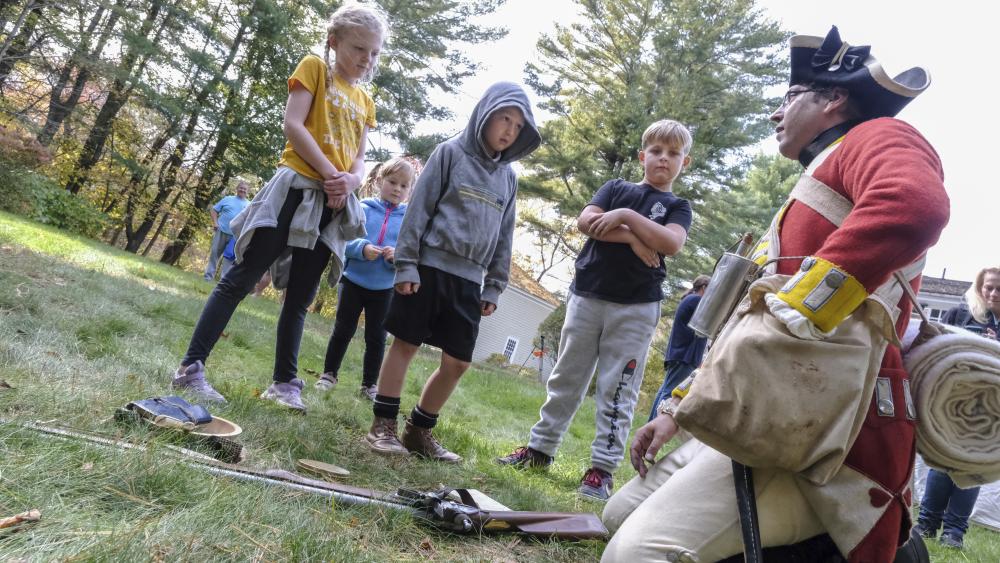 Reenactor Kyle Dunbar, right, unpacks his bedroll to show while kids — including Luke Surdis, 8, second from right — listen as Dunbar shares the unique items soldiers carried to survive on a daily basis.
Reenactor Kyle Dunbar, right, unpacks his bedroll to show while kids — including Luke Surdis, 8, second from right — listen as Dunbar shares the unique items soldiers carried to survive on a daily basis. Dunbar displays colonial cutlery used by soldiers at the time. He said he's accidentally poked himself many times with the two-pronged fork.
Dunbar displays colonial cutlery used by soldiers at the time. He said he's accidentally poked himself many times with the two-pronged fork.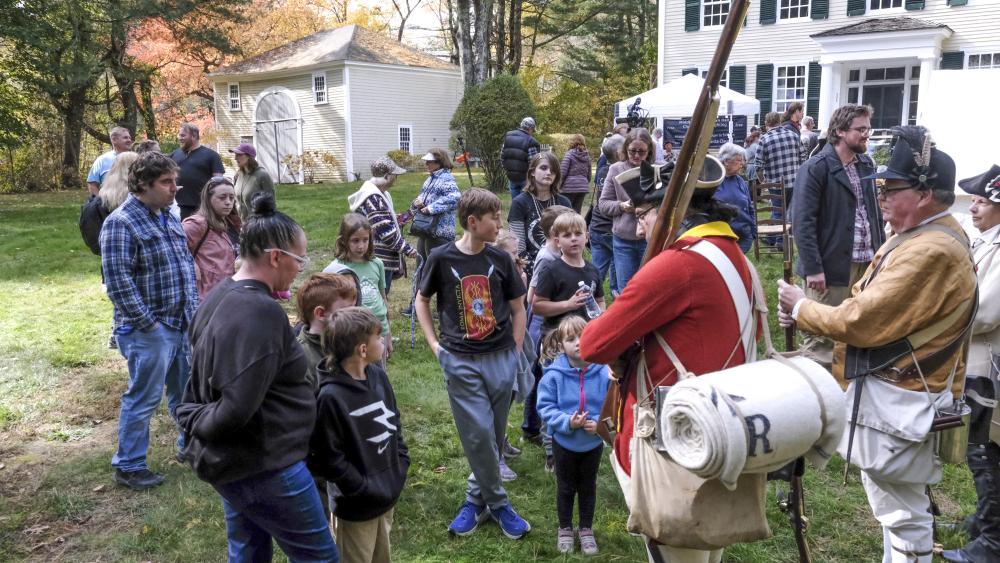 Attendees gather for a closer look at reenactors and the items they carry after a military drill.
Attendees gather for a closer look at reenactors and the items they carry after a military drill. Dunbar displays playing cards that were often carried by soldiers to pass the time.
Dunbar displays playing cards that were often carried by soldiers to pass the time.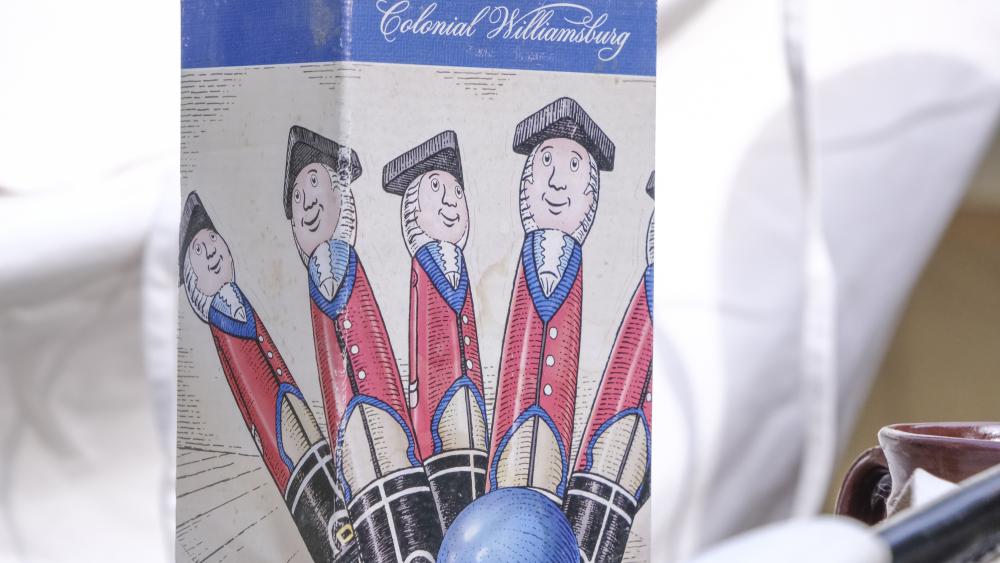 A box-set of miniature wooden bowling pins depicting British soldiers is displayed.
A box-set of miniature wooden bowling pins depicting British soldiers is displayed. 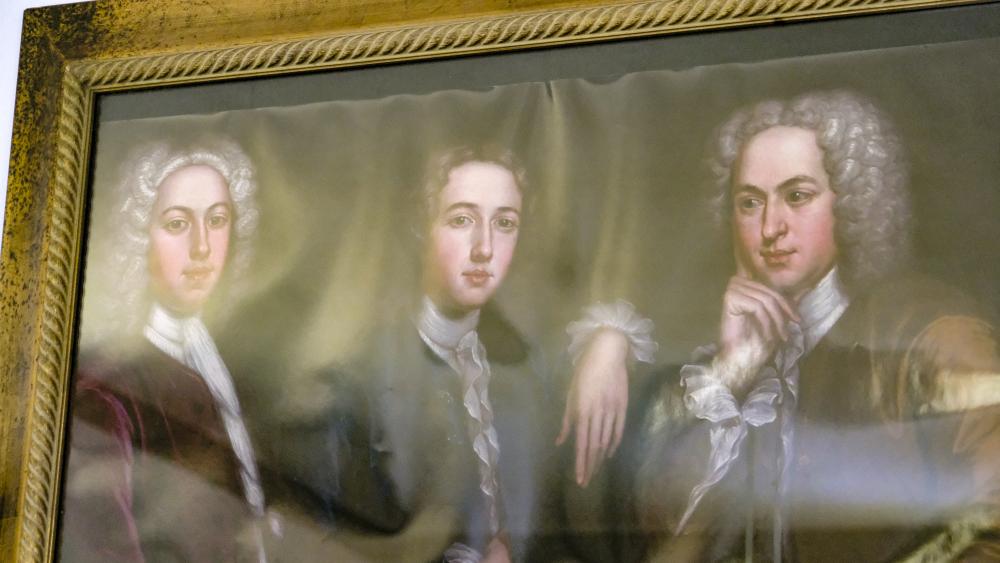 From left: Brothers Peter Oliver, Daniel Oliver and Andrew Oliver are depicted in an original oil painting from the 1700s.
From left: Brothers Peter Oliver, Daniel Oliver and Andrew Oliver are depicted in an original oil painting from the 1700s.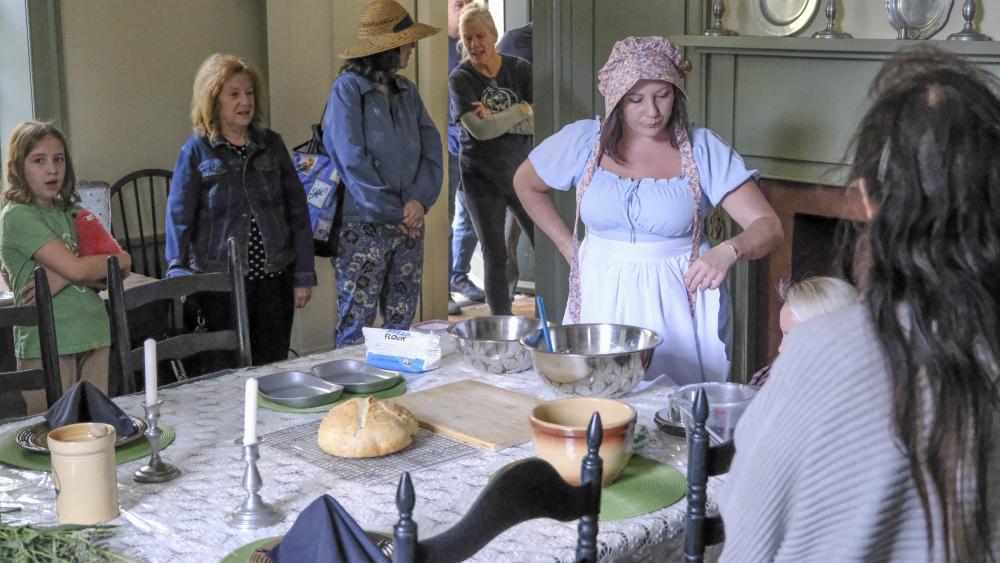 Attendees gather in a room of the estate to watch a bread making demonstration.
Attendees gather in a room of the estate to watch a bread making demonstration. 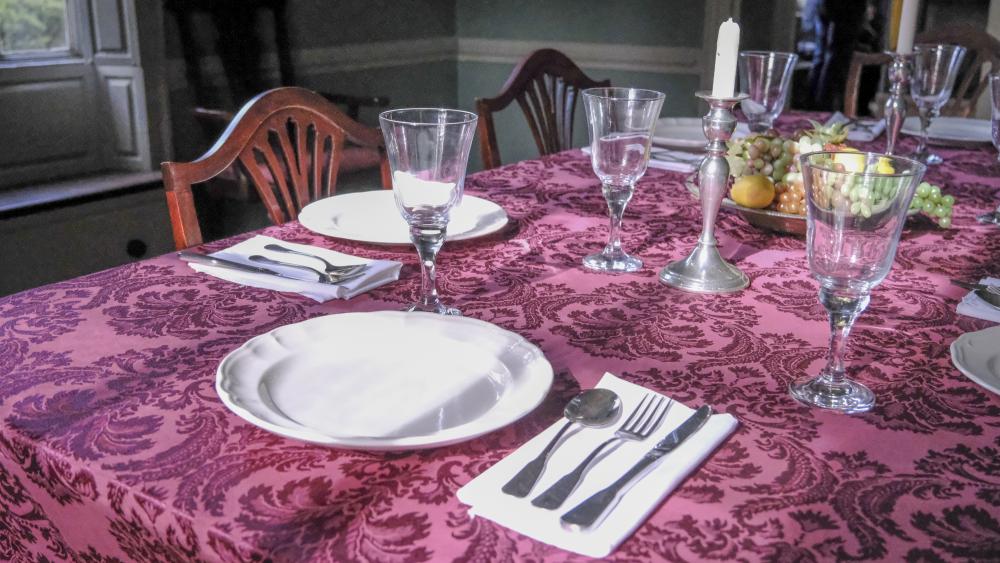 The dining room at the estate. Dalpe said in this room, John Adams would discuss political matters with the Oliver Family.
The dining room at the estate. Dalpe said in this room, John Adams would discuss political matters with the Oliver Family. 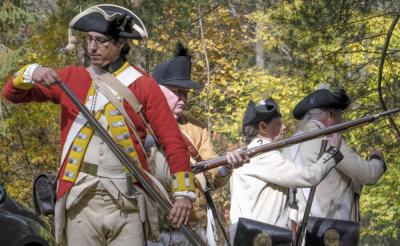 Kyle Dunbar, left, loads a musket during a military drill at the colonial reenactment held at the Oliver Estate in Middleboro, Sunday, Oct. 19. Photos by Sam Tucker
Kyle Dunbar, left, loads a musket during a military drill at the colonial reenactment held at the Oliver Estate in Middleboro, Sunday, Oct. 19. Photos by Sam Tucker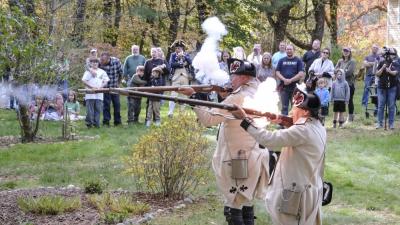 French soldier reenactors fire their muskets in tandem.
French soldier reenactors fire their muskets in tandem.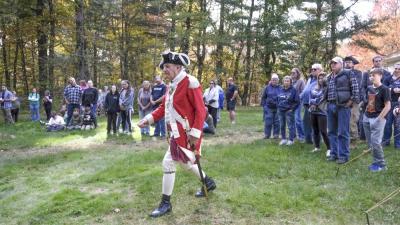 A British soldier reenactor walks in front of the crowd during a drill.
A British soldier reenactor walks in front of the crowd during a drill.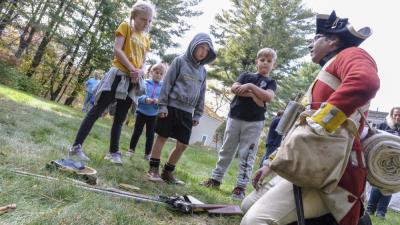 Reenactor Kyle Dunbar, right, unpacks his bedroll to show while kids — including Luke Surdis, 8, second from right — listen as Dunbar shares the unique items soldiers carried to survive on a daily basis.
Reenactor Kyle Dunbar, right, unpacks his bedroll to show while kids — including Luke Surdis, 8, second from right — listen as Dunbar shares the unique items soldiers carried to survive on a daily basis.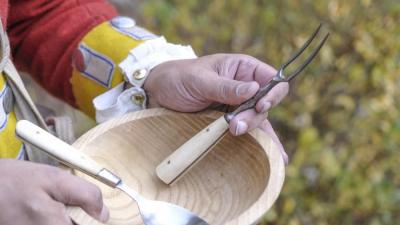 Dunbar displays colonial cutlery used by soldiers at the time. He said he's accidentally poked himself many times with the two-pronged fork.
Dunbar displays colonial cutlery used by soldiers at the time. He said he's accidentally poked himself many times with the two-pronged fork.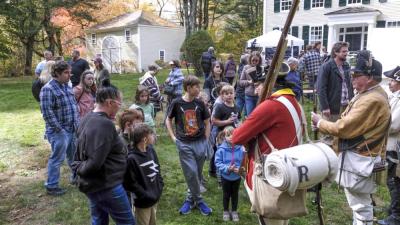 Attendees gather for a closer look at reenactors and the items they carry after a military drill.
Attendees gather for a closer look at reenactors and the items they carry after a military drill.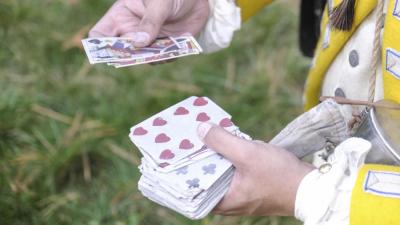 Dunbar displays playing cards that were often carried by soldiers to pass the time.
Dunbar displays playing cards that were often carried by soldiers to pass the time.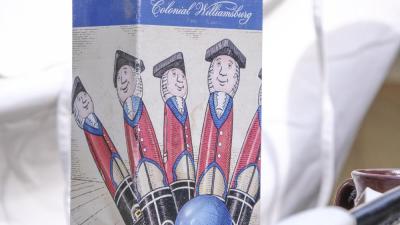 A box-set of miniature wooden bowling pins depicting British soldiers is displayed.
A box-set of miniature wooden bowling pins depicting British soldiers is displayed. 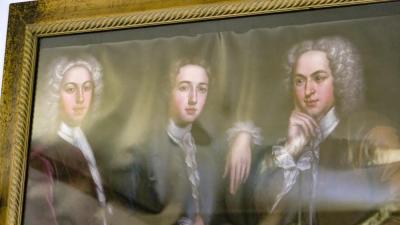 From left: Brothers Peter Oliver, Daniel Oliver and Andrew Oliver are depicted in an original oil painting from the 1700s.
From left: Brothers Peter Oliver, Daniel Oliver and Andrew Oliver are depicted in an original oil painting from the 1700s.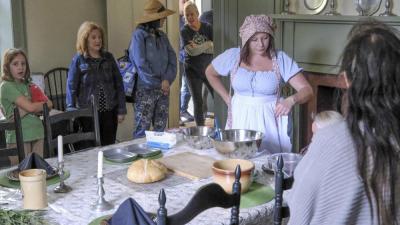 Attendees gather in a room of the estate to watch a bread making demonstration.
Attendees gather in a room of the estate to watch a bread making demonstration. 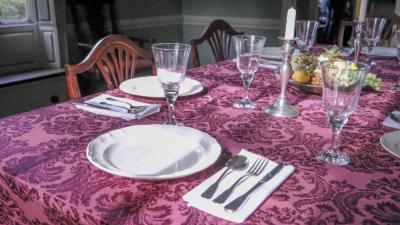 The dining room at the estate. Dalpe said in this room, John Adams would discuss political matters with the Oliver Family.
The dining room at the estate. Dalpe said in this room, John Adams would discuss political matters with the Oliver Family. MIDDLEBORO — Tri-cornered hats, plumes of musket smoke and plenty of colonial education returned to the historic Oliver State in Middleboro, Saturday.
Families didn’t pay a penny to explore the historic estate that has ties to the colonial-likes of Ben Franklin and John Adams. Hosted by the Middleboro Tourism Committee, the event hosted military drills, tours of the estate and colonial living demonstrations during the colonial reenactment.
Middleboro Tourism Committee Chairperson Leilani Dalpe, said sharing the deep colonial history of Middleboro — along with the event being free to the public — is an important part of the committee’s mission.
“Everybody should enjoy this. This is history. It belongs to everybody,” Dalpe said.
The Oliver family built the estate in 1769. The family operated multiple businesses and factories in the area, such as Oliver Mill, and were generally well-liked by townspeople, Dalpe said.
She said the estate’s dining room is where she gets the most “goosebumps.”
“You had John Adams sitting in these chairs talking to Peter Oliver arguing over, ‘we don't want to be under you. We don't want to be taxed by you,’ and Oliver saying, ‘but we brought you here,’” Dalpe said. “That happened in this room.”
Another favorite of hers is the Franklin Room down the hall. The room is named after Ben Franklin, who was rumored to have spent the night in the home after meeting with the Oliver Family.
Attitudes towards the affluent and loyalist Oliver family began to shift when the “winds of the revolution” started to blow in Middleboro, Dalpe said. The family soon came under scrutiny by the revolutionaries of the time. Before long — the Sons of Liberty came knocking.
The Sons of Liberty were known to “storm” loyalists' houses, and they even burnt down Oliver Hall, another Oliver family home in the area. The Oliver Estate however, met a different fate.
“The Sons of Liberty got smart with this place, and they didn't burn it down. They seized it and they sold it. Those funds paid for the beginning of the American Revolution,” said Dalpe. “This house is where it started.”
She said the house itself has been fully restored and preserved to its original state. From the floorboards to the ceiling molding, the home is as period accurate as it gets.
Area residents and friends Kellie Surdis and Caitlin White came to the reenactment with their families on Saturday. They said the no-cost event with a plethora of “living history” that can be heard, seen and touched is a large benefit to their children's homeschool education.
“I just think that it's an incomparable learning opportunity to see it live, versus just reading about it in a book,” Surdis said.
Her son Luke, 8, said he is a “big” fan of the Revolutionary War, and his favorite part of the event was watching the musket drills, and being shown the playing cards soldiers would carry in their packs.
He said if he could, “I’d come back every single day.”
White agreed the reenactment experience offers something more than the history textbooks her children study.
“It's really nice to have a hands-on experience and be able to follow [my kids] passions here. I hop at any chance to be able to open their eyes to new things,” she said.
Reenactment demonstrations included military drills, bread making, and fiber spinning for attendees to learn colonial history up close and personal.
Kyle Dunbar, a Fitchburg resident who came to Middleboro to reenact as a British soldier, took part in the military drills where he fired blank musket rounds with a handful of other French and American reenactors.
After the musket drills, Dunbar unpacked his belongings to show a group of kids. He said he enjoys moments like those — when he shares the lesser-known history that he finds through reenacting.
He spoke on the fact that muskets are indeed accurate — up to 150 yards — and showed the unique items soldiers would carry in their packs. Items included a field-training manual, playing cards, a mirror for fire-starting and spare change for gambling.
“I didn't know a lot about the revolution until I got into this. From there, I thought ‘oh my God.’ It's more than just the British, the Americans, the French and the Germans. There’s so much more than that,” Dunbar said.
This year’s reenactment event was the first since about 2017, Dalpe said.
She said the tourism committee plans to hold more events at the historic estate come December and April. When the estate was purchased by the town in 2014 — during which she served as a Select Board member — she remembers intense debates around the purchase.
Although it was a contentious issue at the time, she is glad it was purchased. She said she is thrilled to bring more events back to the estate.
“If people don't see the monuments to history like this, they're going to forget the lessons that were learned,” she said. “They will forget what people did to get us to the point we're at, and the sacrifices they made.”













